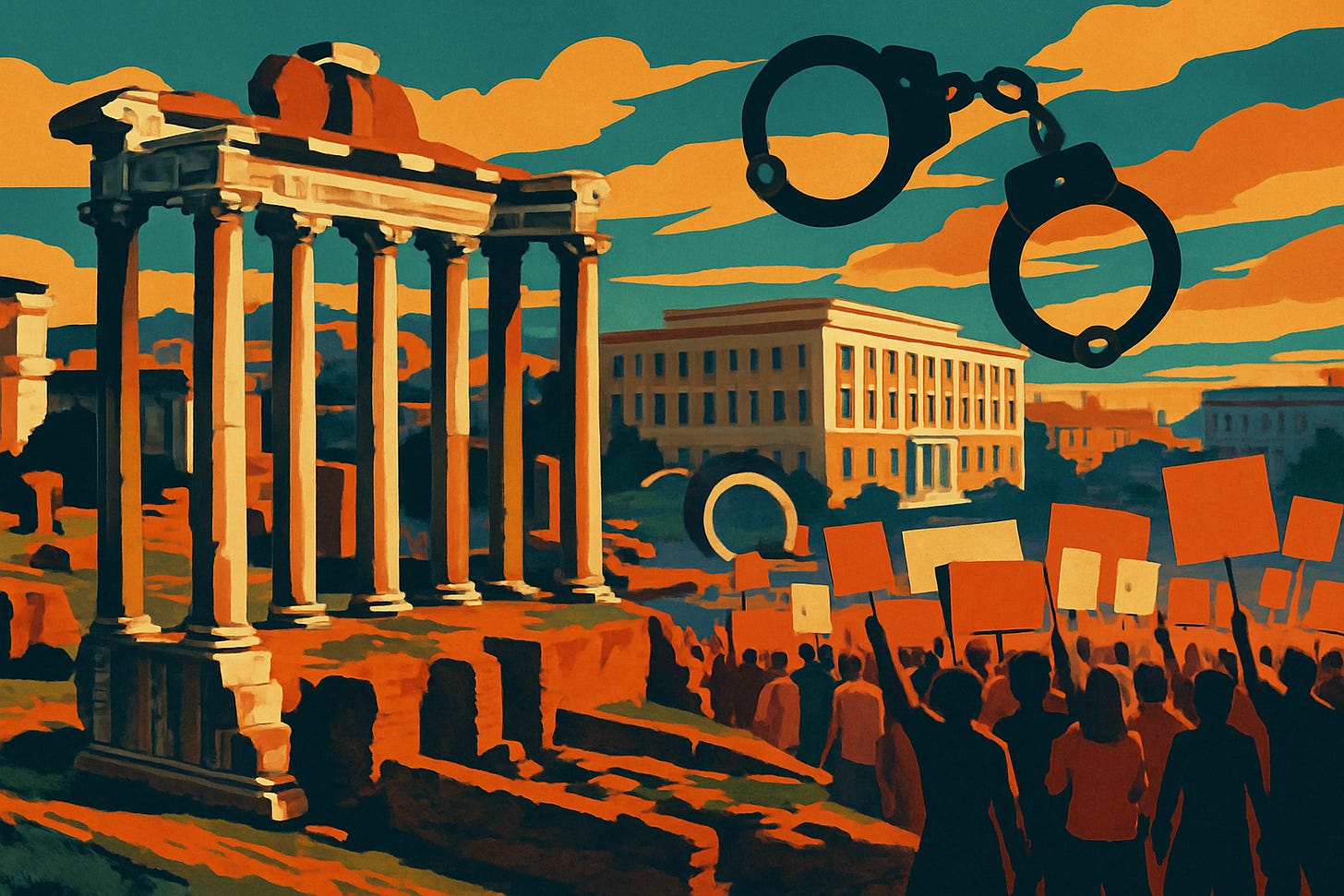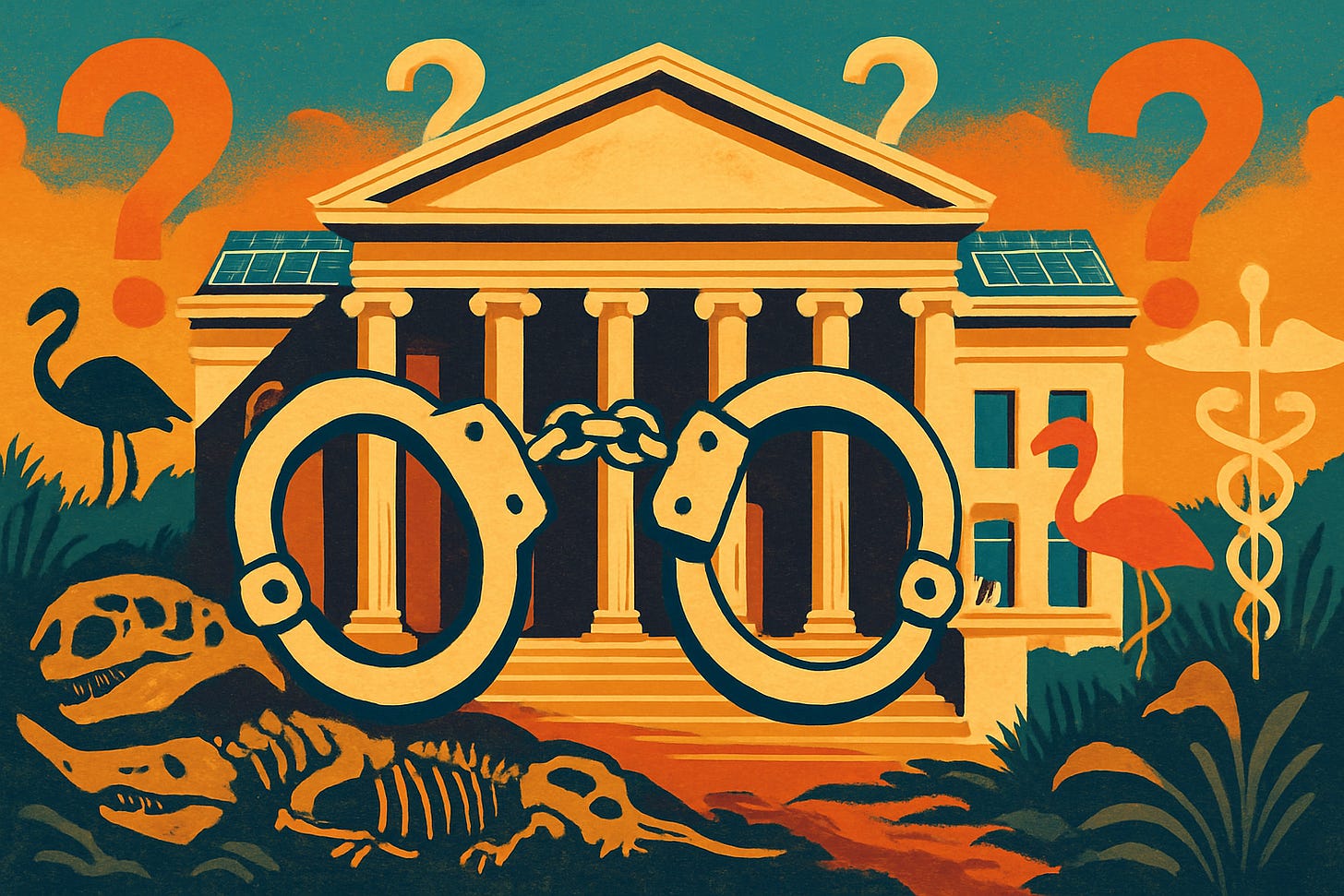When Senators Fear the State: Why America Says "No Kings" Today
From Rome's marble halls to LA's federal building, the pattern repeats
In the late 1990s, during a visit to Rome, I walked around the Forum, trying to picture how Romans must have lived there some two thousand years ago. I also visited the Curia Julia, the Senate House where Roman senators met. Mussolini, never missing a chance to find inspiration in Rome's glorious past, had restored it to its original appearance in the late 1930s. It retained much of its authentic interior, including the original marble floor, as well as some frescoes, mosaics, and relief fragments. I remember the marble walls and the geometric patterns on the floor.
Whenever I visit ancient places, I always try to imagine the real people who once stood where I'm standing. Here, in the Curia, Cato and Cicero came to mind. They stood here, passionately arguing their point of view, believing their speeches would impact policies aimed at preserving the Republic's fragile balance. They were combating corruption, defending senatorial authority against the rise of individual power, enforcing laws against electoral fraud and military overreach, and safeguarding Rome from the creeping threat of tyranny.
I thought about Seneca, the philosopher-senator, who must have often orated here until that fateful day in 65 AD when he was forced to kill himself after receiving Nero's "invitation" to die. The charges of a conspiracy against the emperor were almost certainly fabricated, but in Nero's Rome, truth had become irrelevant. Seneca calmly opened his veins in a warm bath, embodying stoic dignity even as death approached. His forced suicide sent a chilling message throughout the empire: no senator, no matter how distinguished, was safe from imperial paranoia. If the emperor doesn't like your questions, you're done.
Two days ago, I watched the Alex Padilla video from Los Angeles, which you have undoubtedly seen numerous times by now on social media. It brought me right back to that moment in Rome. Senator Alex Padilla, who's been fighting for immigrant rights his whole career, was trying to ask Homeland Security Secretary Kristi Noem a question at a press conference. "I am Senator Alex Padilla," he said as some men, one with large FBI marks on his bulletproof vest, pushed him to the ground and handcuffed him. But like Seneca's protests in Nero's court, his words carried no weight.
The echo is unmistakable. From Rome's marble halls to a federal building in Los Angeles, the pattern repeats: when a state begins to fear questions from its own senators, democracy is already dying.
I've walked through history's warnings before. In Berlin, I stood outside the Reichstag, imagining the building burning in 1933 while Hitler's regime arrested opposition parliamentarians under "emergency decrees." The excuse was always security, always protection from alleged threats. By 1933, communist and socialist lawmakers were disappearing into detention, their voices silenced as the Reichstag became little more than a stage for Nazi spectacle.
In Italy, I visited the sites where Mussolini's blackshirts once marched. By 1924, socialist deputy Giacomo Matteotti's boldness in exposing fascist violence cost him his life—kidnapped and murdered by Il Duce's enforcers. His final speech to parliament, denouncing electoral fraud, became his death sentence. The message to other legislators was clear: ask uncomfortable questions at your own peril.
The FBI later said that Padilla "was temporarily detained by the U.S. Secret Service when he became disruptive while formal remarks were being delivered." Disruptive. That's what they called a senator asking about his department's policies. "If this is how the Department of Homeland Security responds to a senator with a question, I can only imagine what they're doing to farmworkers, to cooks, to day laborers throughout the Los Angeles community," Padilla said afterward.
Today is June 14th, and two completely different visions of America are playing out. In Washington, Trump is throwing himself a $45 million birthday party disguised as a military parade. 6,600 soldiers, 150 vehicles, and 50 aircraft rolling down Constitution Avenue. It's pure spectacle, the kind of thing Nero would have loved.
The last major military parade in DC was in 1991, following the Gulf War; that made sense, as it welcomed troops home after an actual victory. But this time, if it's celebrating a win, I wonder who lost. Was it dissent? Free speech? Democracy itself? Trump even warned that protesters "will be met with very heavy force." That is a clear message.
But there's something else happening today that gives me hope. In Chicago, Pope Leo XIV is speaking to tens of thousands of people at the White Sox stadium, delivering a video message about compassion and humanity. Born on the South Side, he grew up in Dolton, a modest working-class suburb just outside the city - a place marked by industrial landscapes and economic hardship. It's a place often overlooked, where tight-knit Catholic families worked hard to build community amid decades of decline and struggle; he gets it. The contrast couldn't be more obvious.
During another visit to Rome, I walked through the Colosseum, where I kept thinking about how the emperors used spectacles to distract people from how badly they were screwing things up. Nero blamed Christians for Rome's great fire in 64 AD; he made them into scapegoats. According to Tacitus, they were "covered with the skins of beasts, they were torn by dogs and perished," and some were used as human torches to light up Nero's parties. All this bread and circuses stuff while Rome was falling apart.
Every authoritarian needs an internal enemy. For Mussolini, it started with socialists; his blackshirts systematically destroyed their offices and beat up labor organizers across northern Italy. Later, when Hitler pressured him, he turned on Italian Jews with the 1938 Racial Laws, though even his own party disapproved of that policy. Hitler obviously went after Jews, Roma, political prisoners, and anyone who didn't fit his sick vision.
Today, more than 1,800 cities across America are holding "No Kings" protests. People understand that real power doesn't need tanks rolling down the street to prove itself.
Chuck Schumer called what happened to Padilla "sickening; the manhandling of a United States senator." Gavin Newsom said, "If they can handcuff a US Senator for asking a question, imagine what they will do to you." They're absolutely right to be worried.
When Seneca died in that bath, it wasn't just one man dying; it was the Roman Senate's independence bleeding out with him. When they murdered Matteotti, it wasn't just silencing one voice; it was teaching Italy's parliament to be afraid of asking hard questions. When the opposition disappeared from the Reichstag, it wasn't just eliminating dissent; it was democracy itself getting handcuffed and dragged away.
But I believe that all this military pageantry actually shows weakness, not strength. Nero's golden palace couldn't save him when the provinces rebelled and Rome ran out of grain. He ended up killing himself, completely abandoned. Mussolini's big marches ended with him hanging upside down in Milan. Hitler's thousand-year Reich lasted twelve years and ended with his suicide in that grim bunker in Berlin.
While one vision of America is showing off its tanks today, another is quietly speaking to young people in a baseball stadium in Chicago. Meanwhile, thousands of protests will take place all over the country, giving the people a voice. It may take many years, but if history provides us with any guidance, we can safely predict that, ultimately, the voice of the people will last.
The real question isn't whether democracy survives this week's handcuffs or today's parade. It's whether we learn what Seneca understood even as he was dying: dignity and truth outlast every emperor's power parade. The Roman Forum is mostly in ruins now, but the ideas those senators fought for are still alive every time someone refuses to be silenced, every time someone demands answers, every time a citizen stands up and says, "I am a senator. I have questions for the secretary."
That voice, the voice of the people, is something no parade can shut up.
I've been thinking about all these places I've visited: the Forum, the Reichstag, the Capitol, and California, where they handcuffed Padilla. There's this thread running through all of it: democracy is fragile, and it takes courage to keep speaking truth to power. The senators in Rome, the lawmakers in Berlin, and the activists today all remind us that democracy isn't something you can take for granted. There are moments in our lives when we are called upon to fight for it.
If you believe in democracy, keep asking the tough questions. Keep standing up. Because history shows us that when the state starts fearing its own senators, the regime is already in deep trouble. But it also shows us that courage and truth have this way of outlasting even the worst times.
If you ever make it to Rome, walk around the Forum at sunset. It's pretty amazing. If you listen carefully, you can almost hear those old voices reminding you of what's at stake.
I also write the daily Daybreak Notes & Beans newsletter. It delivers hope over despair and progress over panic. I focus on positive stories of human ingenuity, conservation wins, and communities that celebrate resilience. Hit this button if you want to start your day with stories that brighten your morning:
As an example, here is yesterday’s Daybreak Notes & Beans:
Or perhaps you liked the article and want to support my writing by buying me a coffee?








Thank you for putting things so eloquently and tying them to history.
Two things happened when I read this post - I need to get out my Asterix comics and for some reason a 1837 (German) fairy tale by Hans Christian Andersen called "Des Kaisers neue Kleider" (The Emperor's new clothes) popped into my head. I might need to write about that.
Today women are protesting across Switzerland for gender equality. We're still ranking incredibly low but I'm looking towards the US and the protests there. While both are important, a further fall of US democracy would be devastating.
"If you believe in democracy, keep asking the tough questions. Keep standing up. Because history shows us that when the state starts fearing its own senators, the regime is already in deep trouble. But it also shows us that courage and truth have this way of outlasting even the worst times."
This may be your most important essay. At the end of the day we should have a clear idea where in this country our ideals are strongest and where are our weakest links. An important time to be heard. Let freedom ring.